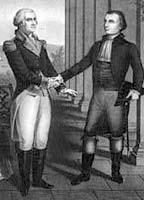Making Personal Connections to the Past by Finding Historians

Is there a historian that would be willing to Skype a 4th -grade classroom on the American Revolution?
At a National Archives lecture historian David McCullough once made a startling but quite obvious assertion. "Each of us has," he reminded the audience, "at our disposal the world's greatest research device: the telephone." Times have changed since that 1993 lecture I attended and so too has technology, but McCullough's message still serves us well almost two decades later. If you want to find something—or in the case of this article, someone—you have to reach out.
It matters not what grade level you teach. If you are interested in hooking up with historians to help you enliven your curriculum or fuel your own intellectual yearnings, you must be the one to make the leap. I have been literally connecting historians with my Applied History class at West Springfield High School since 1992, when we held a long-distance phone conference with filmmaker Ken Burns. Since then students have connected with many historians by speaker phone including Edward Linenthal, Louis Masur, Robert Utley, Nicholas Lemann, and the late Walter Lord, among others.
Since the inception of the collaborative Teaching American History Grants I believe that historians, more than ever, are willing to talk with you and your students. So how do you get started and once you have the process in place what do you do?
Say you are studying the American Revolution and George Washington and you want your students to interact with a Revolutionary War era historian or biographer. Start with where George lived, his home in Mount Vernon, VA. Most top-drawer historic sites have a direct pipeline or e-connection to historians who are working in the site-specific subject matter. Chances are these sites have educational curators or specialists on staff that can help you find someone who can speak articulately to the topic at hand.
What is essential is that once the process gets underway you and your students do their homework. Like any research project you and your students must invest the necessary time to make it successful and meaningful. Planning is essential. You need to consider how far out into your curriculum you want to hold such a conference. We all have busy schedules and it is imperative that you be flexible with the person to whom you are connecting. I generally plan for two months out or longer when I make my first pitch. Your students need to prepare, too. If you are connecting with an author you must ensure that your students read the author's work beforehand; otherwise, there will be awkward pauses.
What I do is have students submit to me, several days before the scheduled conference, an index card with a question that they are posing for the author. I read through the cards and select the best questions. Before I make the phone call I pass out the cards to the students and then bring them up to the speakerphone one by one. A brief introduction is made and then the question is posed. What generally evolves is a conversation between the students and the historians with me facilitating the call, but staying in the background. These are moments for the students.
For elementary students, you may need to do even more preparation. Make sure students have studied the topic recently and are familiar with what historians do. While they may not have the reading skills to read the historian's text, you can still introduce his or her area of expertise, the subject matter that she or he studies, and some age-appropriate texts. Introduce the kinds of questions that may be appropriate for the conference, for example, pointing out that "how" questions and "why" questions will elicit more of the historian's expertise than factual ones that can be answered by consulting a textbook or encyclopedia. This is an opportunity for students to also ask questions that get at what is exciting, puzzling, or ambiguous about the historical topic. And they can find out more about why a person would become an historian, the day-to-day aspects of research, and the ways historians work to decipher history through investigating pieces of the past. In any case, you may need to devote some lessons to effectively preparing your young students for a productive conversation.
Consider also working with your local university history departments. With collaboration being the operative word in education these days, make it real. You might even be able to get the person to come and visit your classes, taking the whole process to a very different level. Also, for information on museums and historic locations in your area, check out the Museums and Historic Sites section of our website.
Ambling down this path may at first seem risky, and it is. I was very nervous when I contacted Ken Burns's studio in 1992 to ascertain the possibility of such a conference call. What I have discovered since then is, if you are genuinely sincere about your motives on behalf of your students then you and they will discover the power of making just such a connection. And I honestly believe that the person on the other end of the line from you and your students actually enjoys the outcome, too. I have never received an answer of "no" from anyone of whom I have made the request. And that I think speaks volumes.

